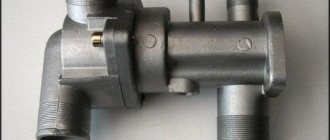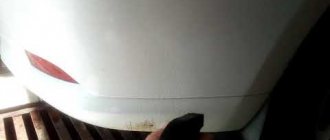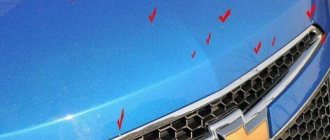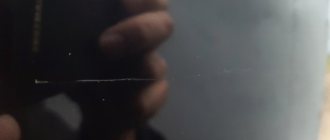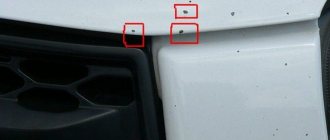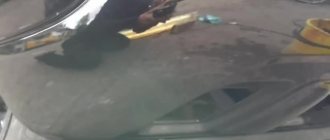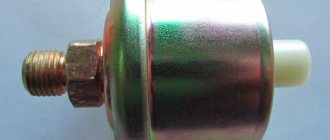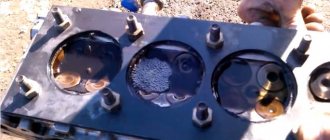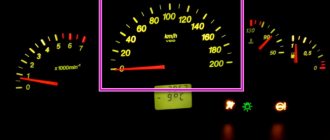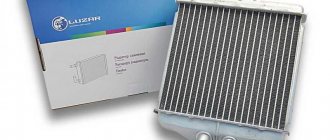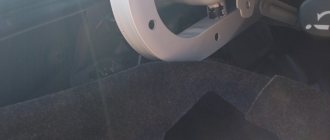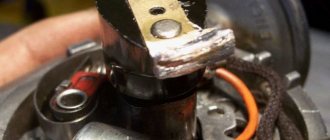The first manifestations of through body corrosion in cars of the domestic automobile industry appear already in the second year of operation. In this case, it is not necessary to contact a car repair shop, since repairing holes in the car body without welding is quite simple. Craftsmen have come up with several ways to quickly patch small holes, such as arches or holes in the wing. However, methods without welding are unacceptable for repairing power elements.
Body repair with putty
This method is used when you urgently need to repair a small hole without welding or there are no other options for car repair. However, it should be understood that this is a temporary measure, since the putty will quickly crumble. To repair the damage, use a special putty with small, medium, and large glass fibers. When preparing it, you need to ensure that there are no air bubbles. To create an even layer, a lining is installed on the back of the hole.
A primer is applied to the prepared area of damage. After it dries, putty with large fibers is applied. Depending on the size of the hole, several layers are applied and each layer is completely dry. The total thickness should not exceed 2 mm, otherwise the patch will begin to crack. The last layer is applied with fine fiber putty. The repaired surface of the car is treated with fine-grained sandpaper.
Fiberglass and mesh
To repair more extensive damage, an aluminum patch mesh is used. A piece slightly larger than the hole is cut out of it and attached with masking tape. Next, sealing holes in the car body without welding is carried out in the following sequence:
- a thin layer of fiberglass putty is applied without touching the tape;
- after drying, the tape is removed;
- subsequent layers of putty are applied after the previous one has dried;
- the surface of the car is treated with sandpaper or a grinding machine until smooth;
- To strengthen the mesh, several layers of putty are applied to the back of the body.
Long-term auto patches are made from fiberglass and epoxy resin. Several overlays are cut from it, the first of which should cover the hole with a margin of 2 cm. The size of each subsequent piece is made larger than the previous one. The last overlay should cover all the metal stripped during the preparation process.
The cut pieces are impregnated with resin and placed on the hole in a sequence of increasing sizes. If you need to seal large holes on the back of the body, use linings to prevent the fabric from sagging. After laying all layers of fiberglass, wait for the resin to completely harden. The time required for this is indicated in the instructions.
Other solutions
Recently, it has been possible to close the holes in other ways. One of them involves working with fiberglass.
- The surface of the body is also cleaned and degreased, as in the two cases described above.
- Overlays are cut out of fiberglass, the size of which should be 2 cm larger than the hole size.
- The area is pre-primed and the composition is given time to harden.
- The pad is applied to a completely dry surface.
- Fiberglass linings are fixed using an adhesive-resin composition.
First, one overlay is glued, then the second, third, and so on. Again, it is recommended to put a lining on the reverse side.
After the glue has dried, the body surface is treated and painted.
As you can see, holes on the car body caused by corrosion can be easily eliminated with your own hands. Visual examples can be seen in the video and photo.
Car body soldering
This method is used to seal small and large holes without welding. To work, you will need flux, which will protect the metal from rapid oxidation. Soldering acid, sold in radio stores, can successfully cope with this task. To achieve the required temperature, you will need a soldering iron with a power of 1 kW or more, or a version heated with a blowtorch, but it is better to use a gas torch. The solder is chosen to be refractory, since it can be used to repair a hole in the car body more reliably.
Rivets
This method not only repairs large holes in the car body, but also replaces parts (fenders, aprons) without welding. In terms of reliability, it is not inferior to welding. It is recommended to install rivets in an inconspicuous place. Since there is no splash of molten metal during operation, like welding, it is often used to repair car floors.
The riveter required for the job can be bought in a store (costs approximately 500 rubles). The technology is simple:
- The patch is cut so that it overlaps 2 cm around the edges of the hole.
- By attaching it to the body, it is given the desired shape.
- The locations of the holes for the rivets are marked.
- After drilling the patch with a drill according to the diameter of the rivets (4 - 6 mm), it is advisable to countersink the edges of the holes so that it fits more tightly to the surface of the car body.
- Having applied the patch again, the center of the first hole is marked and drilled.
- After riveting it and leveling it, the patches are tapped and the remaining holes are drilled in place.
- To ensure a tight fit of the patch to the car body, rivets are fastened from the center to the edges.
- To prevent moisture from getting inside, the joint around the perimeter and rivets is coated with sealant.
Damaged the ceiling lining in the car. How to fix it?
I love being a father. This is how you become younger. This is also an opportunity to start life over again, looking at it from a different angle.
Kent's friend performed this alone ((holes from heels
Kent's friend performed this alone ((holes from heels
I love being a father. This is how you become younger. This is also an opportunity to start life over again, looking at it from a different angle.
Twice flame hero
I'm a family man, I'm much more prosaic)))
Knight of the Order of the Flame
I'm a family man, I'm much more prosaic)))
ask your wife to mend
Well, either carefully glue it, or drag the entire ceiling.
she doesn’t mind, but she doesn’t vouch for the result)
I love being a father. This is how you become younger. This is also an opportunity to start life over again, looking at it from a different angle.
What to glue it with? This needs to be somehow distorted from within. (
such things happen on the roads that it’s even scary to buy a license
Twice flame hero
I understand that I don’t have a Bentley, but there’s no way to forget about it; after all, the car is three years old. Here is a photo of the trouble on your phone
I love being a father. This is how you become younger. This is also an opportunity to start life over again, looking at it from a different angle.
Thrice hero of the flame
It may be possible to use what thread to repair the clothes, what kind of thread the tape will be slipped in and heated with an iron, but Boon is right that the glued one will be even more conspicuous.
Thrice hero of the flame
can sew with thread and a semicircular needle and so on.
Twice flame hero
I love being a father. This is how you become younger. This is also an opportunity to start life over again, looking at it from a different angle.
Yes, pull up the roof and that’s it, what are you doing?
That's it, I fixed it. aftar from you 100 bucks
That's it, I fixed it. aftar from you 100 bucks
Thank you! It turned out great! I won't even bargain, here you go.
Yes, pull up the roof and that’s it, what are you doing?
I love being a father. This is how you become younger. This is also an opportunity to start life over again, looking at it from a different angle.
Source
Final stage
Regardless of how the car body was repaired, they all end with putty. However, it absorbs moisture, which leads to rapid destruction. Therefore, it must be coated on top with an anti-corrosion or epoxy primer. Body repairs are completed without welding by painting. To do this, use a spray gun or aerosol cans, after covering the adjacent surface of the car with plastic film. You should not use a brush, as drips are possible.
How to repair through holes on a car body using putty without welding
Before repairing a hole in the car body, you should prepare:
- fiberglass and automotive putty;
- aluminum mesh;
- putty knife;
- sandpaper (if possible, it’s also worth looking for a sanding machine);
- primer, paint, varnish.
Fixing holes in a car body itself is distinguished by its simplicity. First of all, you should remove the rust using an angle grinder or any other suitable equipment. Next, we cut out the patch from aluminum, and then attach it to the body using masking tape. We apply a thin layer of fiberglass putty (here it is important not to touch the tape, because then you will have to remove it). When the putty sticks, peel off the tape and putty the remaining areas.
No welding
This method of repairing through corrosion is not the most pleasant for the buyer. Since the procedure is cheap and does not take much time. You can restore half a door or wing. Be sure to check the car with a thickness gauge when purchasing.
Materials and consumables
You will need fiberglass or fiberglass. And epoxy or polyester resin. For a relief area, fiberglass is better suited. It perfectly follows any shape. Steel mesh also works well. What is used in air filters. And:
- Grinder with a cleaning and cutting wheel;
- Converter;
- Epoxy putty;
- Polyurethane foam;
- Molar tape;
- Brush;
- Stationery knife.
Preparation
Before starting, you need to prepare the exterior and remove the paint. Use a grinder to clean off the oxide. If necessary, cut out rot. Then we tape it around the hole and foam it. We press the cardboard so that the excess does not come out. This will make it stronger and less porous.
Attention!
When working with polyurethane foam, the surface is wetted for better adhesion. But not in this case, since moisture is dangerous for metal!
Then we wait for it to dry completely and harden. And we begin to carefully trim off the excess with a stationery knife. Outputting the form.
Repair process
The process is up to you. There are two ways. The fastest and without any problems. This is simply taking epoxy putty and applying it directly to the foam. We wait until it dries completely and sand it. We decorate and enjoy. Until the molding falls off.
There is also a second way. We apply fiberglass to the repaired part. And use a brush to impregnate it with resin. Then let it dry. As a result, we carry out the procedure 3-4 times. The result is a dense, strong patch. And we’re already putting putty on it. After stripping, a rigid and reliable structure is obtained. With little through corrosion , the method is excellent.
Using a soldering iron
There is another way to repair a hole in a car body without welding. A soldering iron is required here. First of all, we clean the area from rust. We make the patch from a sheet of metal (you don’t need to worry too much about this; an ordinary can of auto chemicals will do).
It is important that the patch is slightly larger than the holes and also completely covers them.
Additionally, you can coat the metal surface with anti-corrosion compounds - this will increase the quality of our repairs. Then we service the edges of the patch, after which, using a fairly powerful soldering iron, we solder it with a continuous seam.
Next, you should check whether it turns out that the patch protrudes somewhat above the body. If there is a protrusion, we eliminate this deformation with several gentle blows of the hammer. We remove various dents with putty (it is important that its layer reaches no more than 2-3 mm, otherwise the material will crack). Before filling, clean the surface with a metal brush.
In order for the putty to adhere well, it is important that abrasive marks (small scratches) appear on the patch.
The next step is primer. Here it is necessary to complete everything as quickly as possible to avoid the possibility of rust occurring in the future. It is best to first apply a thin layer of phosphate primer, and when it dries, another two or three layers of acrylic two-component composition (the interval between applications should be about 5-10 minutes). Everything dries in about 3-4 hours; if there is infrared heating, you can reduce the procedure to 20 minutes.
It is worth noting that this solution is more durable than in the case of aluminum mesh, and it can be used to eliminate holes of almost any size.
So, in the article we discussed how to repair holes in a car body without welding. It is worth noting that these options are not the most optimal. Naturally, it is better to turn to professional vehicle repair specialists. At the same time, self-repair will help give the body an aesthetically attractive appearance and also prevent further development of corrosion. Both options are distinguished by their simplicity, so repairs can be performed even without special knowledge and skills.
Video on how to solder a hole in metal:
Option #2. In case of serious damage
Step 1
Take a piece of any chunky fabric. It can be used as a lining. Cut out a rectangular patch. Round the edges. So it’s quite easy to push it into the damage and smooth it under the upholstery.
Step 2
Let's take glue and a needle. We apply it to the needle and make a patch. Apply the glue carefully so that the patch does not move out of place.
Step 3
Pour glue onto the created backing. It is also possible to apply it to an external patch. It won't really change the essence.
Step 4
The most careful moment. Gluing a piece of fabric onto the seat covering. Where can I find patching material? As a rule, it can be cut from the lower seat upholstery.
Step 5
We press down the supplied patch. Hold for a few minutes.
Ready! Your seat has returned to its original appearance! Congratulations !
Source
